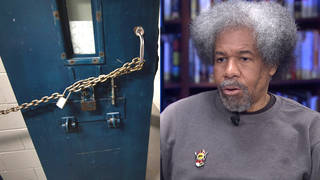
By Amy Goodman and Denis Moynihan
Albert Woodfox turned 69 years old Friday. He also was released from prison that day after serving 43 years in solitary confinement, more time than anyone in U.S. history. “Quite a birthday gift,” Woodfox told us on the “Democracy Now!” news hour, in his first televised interview after gaining his freedom. Woodfox is a living testament to the resilience of the human spirit when subjected to the cruel and unusual punishment of solitary. His case also serves as a stark reminder of the injustice that pervades the American criminal-justice system.
Woodfox was in his early 20s when he was imprisoned for armed robbery in 1971. He was sent to the notorious Louisiana State Penitentiary, known as Angola, a sprawling prison complex with 5,000 prisoners, located in rural Louisiana on the site of a former slave plantation. It gets its name, “Angola,” from the country of origin of many of those slaves.
Conditions in Angola in 1971 were so violent and appalling that Woodfox, along with another prisoner, Herman Wallace, formed one of the first prison chapters of the Black Panther Party. In 1972, Woodfox and Wallace were charged with the murder of prison guard Brent Miller. No physical evidence linked the men to the crime. A bloody fingerprint at the murder scene, which matched neither Wallace’s nor Woodfox’s, was ignored by authorities. Robert King, another prisoner who joined their Black Panther chapter, was charged with a separate crime in the prison. The three were sent to solitary confinement, where they remained for decades, always maintaining they were innocent of the charges.
Albert Woodfox recalled those early days of organizing inside of Angola when we spoke with him just days after his release: “The saddest thing in the world is to see a human spirit crushed. And that’s basically what happened with these young kids that was coming to Angola. And we decided that if we truly believed in what we were trying to do, then it was worth taking whatever measures necessary to try to stop this.”
Even back then, the Angola 3, as they became known, were well-aware of the potential impacts of solitary confinement. Woodfox recalled during our interview, “When we were first put in CCR [closed cell restriction] in ‘72, myself, Herman Wallace and Robert King, we knew that if we had any chance of maintaining our sanity and not allowing the prison system to break us, that we had to keep our focus on society and not become institutionalized.” When I asked Woodfox what he read in prison, he told me, “History books, books on Malcolm X, Dr. Martin Luther King, Frantz Fanon, James Baldwin.”
A movement grew, globally, to free the Angola 3, with Amnesty International and other organizations calling for their release. Documentaries were made about the case. In one, the widow of Brent Miller joined the call, saying in 2010, “These men, I mean, if they did not do this—and I believe that they didn’t—they have been living a nightmare for 36 years.”
Two major impediments to their freedom were prison warden Burl Cain and Louisiana Attorney General James “Buddy” Caldwell. Cain was the key decision-maker in keeping the men in solitary. In a 2008 deposition in Woodfox’s case, Cain admitted, “I still know that he is still trying to practice Black Pantherism.” And while Woodfox’s case was overturned on three separate occasions, with a federal judge ordering his release, Attorney General Caldwell insisted on repeatedly retrying the case. Cain resigned in December, facing state ethics violations and a criminal probe for business dealings during his reign as the longest-serving warden in Angola’s history. Caldwell lost re-election to fellow Republican Jeff Landry, who allowed Woodfox to leave prison on the condition that he plead “no contest” to manslaughter.
Woodfox squinted into the camera lens as he spoke on “Democracy Now!.” The years of confinement in a 6 by 9 foot cell had damaged his vision. He is proud of his activism. “We’ve put this solitary-confinement issue before American people, before the people of the world, and it just started building,” he said. “It got to the point where it wasn’t just about the Angola 3, but it was about solitary confinement.”
Robert King was released in 2001, his conviction overturned after serving 29 years in solitary confinement. Herman Wallace was freed in 2013, only after a federal judge threatened to jail Cain if he refused to release him. Wallace died one day later of liver cancer. On Monday, we asked Albert Woodfox about his future plans: “I’ve been locked up so long in a prison within a prison. So, for me, it’s just about learning how to live as a free person,” he told us. “I’m just trying to learn how to be free.”











Media Options